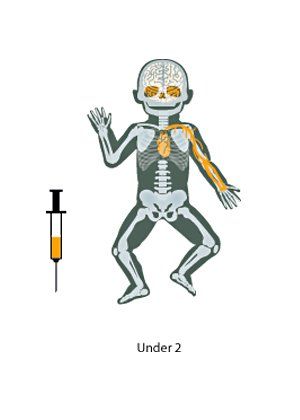
DEVELOPMENTAL SCREENING
The AAP recommends that infants and young children be assessed for developmental delays and behavioral disabilities. Talk to your child's doctor about the types and frequency of screening that might be needed.
BLOOD TESTS
The AAP recommends that hemoglobin or hematocrit levels be checked at 1 year of age (and repeated at future checkups only if the doctor feels it's necessary).
VACCINES
Children should get all the required vaccines, following the ACIP's published schedule. The typical immunizations are for hepatitis B, rotavirus, diphtheria, tetanus, whooping cough (pertussis), Haemophilus influenzae, pneumococcal disease, polio, measles, mumps, rubella, hepatitis A, and chickenpox. A yearly flu shot is also recommended for children 6 months and older.
ORAL HEALTH
The USPSTF recommends that you talk to your child's doctor about fluoride supplements if you live in an area with fluoride-deficient water.
The AAP recommends that children get a dental checkup at 1 year of age (or within 6 months of their first tooth, says an ADA spokesperson). Tooth brushing twice a day is essential as soon as the first teeth begin erupting. Parents should also start weaning children off pacifiers at age 1.
SECOND OPINION | VACCINES
Before the advent of vaccines, mumps was a major cause of deafness in children, polio paralyzed thousands, and rubella led to miscarriages and infant death. Today, many infectious diseases have been reduced or eliminated in the U.S., and some parents are more concerned about the ingredients in vaccines than the threat of illness. Some are choosing to space out their children's shots; a minority aren't vaccinating their kids at all.
The CDC recommends that children be given a series of immunizations in the first two years of life to protect against 14 different diseases, including diphtheria and chickenpox. Babies are small and vulnerable, so it's not surprising that the question arises: can their tiny bodies handle so many vaccines at such a young age? A number of concerned moms have turned to the "Alternative Vaccine Schedule," published by pediatrician Robert Sears, in which Sears suggests getting fewer shots at each infant checkup and spreading the shots out over a longer period of time.

Infectious-disease experts say altering the CDC's schedule is scientifically unfounded and potentially dangerous. The reality is that babies are bombarded by foreign substances the minute they're born, says Dr. Margaret Fisher, chair of the American Academy of Pediatrics' Section on Infectious Diseases. Their immune systems are still developing, yes, but they are capable of handling an influx of daily toxins and bacteria. At the same time, the protection babies receive from their mother's antibodies is "pretty much gone," by 6 months of age, says Fisher. Because everything in their bodies is so small, including the airways and ears, serious infectious diseases can hit young infants especially hard. And they're unable to articulate how they feel and, perhaps most important, when they're feeling worse. "That's why it's essential to get those vaccines front-loaded," says Fisher. "We feel passionately that children should be immunized on schedule."
—Research by Ian Yarett
Healthy Living: The Complete Package
Uncommon Knowledge
Newsweek is committed to challenging conventional wisdom and finding connections in the search for common ground.
Newsweek is committed to challenging conventional wisdom and finding connections in the search for common ground.





